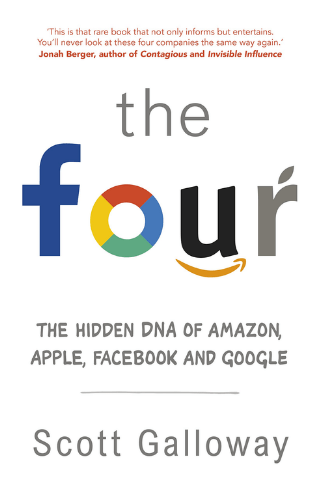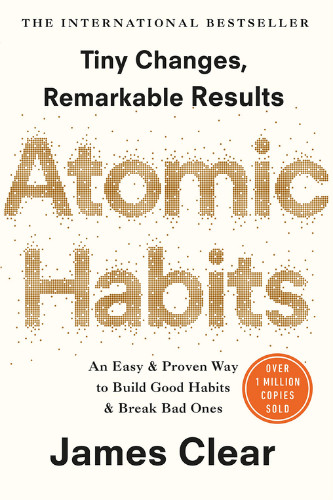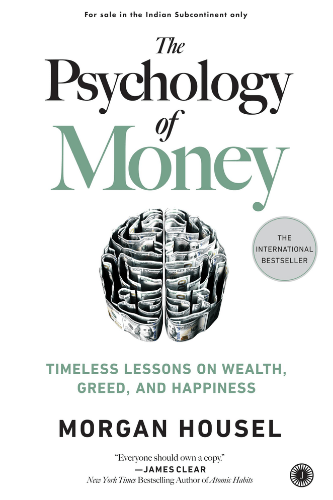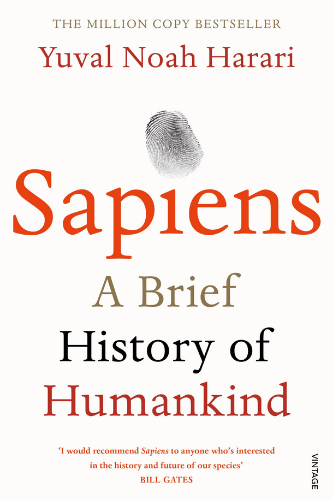Scott Galloway studied finance at UCLA and worked as an investment banker at Morgan Stanley. He has been on the boards of Amazon rivals Urban Outfitters and Eddie Baur. His book “The Four: The Hidden DNA of Amazon, Apple, Facebook, and Google” is available for free pdf download
| Book | The Four: The Hidden DNA of Amazon, Apple, Facebook, and Google |
| Author | Scott Galloway |
| Publisher | Random House UK |
| Language | English |
| Pages | 320 |
Also Download: Sell Like Crazy Book PDF Download
Summary of The Four Book and PDF Download
This book analyzes not just the four major internet firms’ huge expansion and breadth of influence in customers’ everyday lives, but also the hidden risks that these businesses may represent on a national and global scale. When companies like these get too big, Scott says, they acquire the power to eliminate all forms of competitors and change laws as they see fit. Scott uses analogies and parallels throughout the book to show readers how strong these companies have become, as well as the potential problems that the average customer may overlook while using their goods on a regular basis. Scott also uses this book to discuss what the future holds for young professionals, as well as how he feels they should approach their careers in a world dominated by huge corporations.
He claims that one of the main reasons these enterprises became so successful was because they stole ideas and intellectual property from already existing businesses. After an overview of each company, Scott devotes a section of the book to exposing some of the company’s most nefarious practices.
Another of Scott’s main themes in the book is that these four companies get away with more than other companies because of their size and breadth. He goes on to say that they are given autonomy because society and politicians see them as doing “good” for customers. Only six nations in the world, according to Scott, have a GDP bigger than The Four combined. In 2017, the average S&P company paid 27 percent of its income in taxes, while The Four paid less than 15-20 percent because the government allowed them to conceal and spread revenues to lower their tax rates. According to Scott, this is only one of many morally reprehensible acts that have harmed our culture. Scott also cites other instances of The Four’s business practices that he considers to be risky. He thinks that, because of Amazon’s wealth and influence, it can simply issue a negative press release about a competitor and see the stock price of that company plummet in a matter of days. The question is whether such a large amount of power is too much for a single organization to handle. In the case of Apple, Scott points out that the iPhone has been given “holy status,” granting it security features never before seen in consumer electronics. According to Scott, after 14 people were killed in a terrorist assault in San Bernardino, the FBI tried to persuade Apple to provide software that would enable them to access the perpetrator’s phone. Apple declined, and the FBI’s options were limited due to widespread public backing. Whether the phone was a blackberry built in a foreign market, Scott wonders if a search order might have been obtained and executed in a matter of hours. Law enforcement and their ability to do vital tasks are deteriorating as a result of society’s devolution of power to I-phone and Apple. When it comes down to it, Scott believes Facebook is really a media company. Media firms have a duty to their viewers to ensure that the information they deliver is reliable. Facebook, on the other hand, purports to be nothing more than a “platform.” As a result, they are no longer responsible for ensuring that the content on their platform is accurate. The majority of people acquire their news through Facebook feeds, as seen by the recent presidential election. Because Facebook is not responsible for verifying the accuracy of the information it posts, the majority of what users see may be false. The threat this poses in today’s political environment is obvious. The book goes on to say that one of the main reasons The Four get away with their risky behavior is because they project a liberal and progressive image to the general population. According to Scott, businesses do this to appeal to society’s primarily progressive clientele, who see companies as actually representing the best interests of their consumers.
Analysis
While Amazon, Google, Apple, and Facebook may provide excellent goods and services to their customers, Scott Galloway’s central thesis in The Four is that they are all engaged in hazardous business practices that allow them to gain enormous and uncontrollable influence in today’s global economy. While The Four seems to be a general review of the issue, Scott Galloway goes into sufficient detail and provides sufficient statistical data to establish it as a reliable source in this area of technology law. Scott’s consistent use of analogies is his most effective approach for conveying to the reader the power of large corporations. Scott’s comparison of each business to a distinct part of the human body was one of the most striking. He compares Google to the brain because of the ability for customers to have limitless access to knowledge at their fingertips, Facebook to the heart, Amazon to the stomach, and Apple to the reproductive system to emphasize the “sex appeal” of Apple’s technological products. With strategies like these, Scott makes it easy for the reader to see how these businesses have learned to target our core consumer desires in today’s market. Because of the extensive use of references supplied throughout the work, I found the material in this book to be really effective. Scott supports his statistical study for each of the four corporations using academic papers, books, financial data, and articles, among other sources. Simultaneously, he does an excellent job of keeping the reader interested and involved in the topic. The book is well-written for everyone, but it’s especially well-written for someone who has no previous knowledge of how major corporations operate in the marketplace. Overall, Scott has written a book that is simple to read and understand, allowing the average reader to go further into his investigation of these groups.
Evaluation
Overall, Scott Galloway succeeded in describing what motivates firms to become so large in today’s consumer market, as well as the potential pitfalls. The book does, however, include a few points of disagreement. Scott’s personal past and experiences are the most evident, and they may have influenced his views on large corporations and the government’s role in their regulation. Scott admits to being a product of “big government,” having graduated from high school and attended college before anybody on his father’s or mother’s side of the family. He formed and served on the boards of many companies, many of which were victims of The Four, as previously stated. As a result, he’ll have to examine his own biases and assumptions about these companies. On the other hand, it might be claimed that these events gave him a better understanding of The Four’s inner workings. With that being said, Scott does an excellent job of presenting facts and statistics in a balanced manner. Regardless of whose side of the aisle one stands on, he does an excellent job of emphasizing to the audience that these firms are becoming too large for the government to ignore. Otherwise, their reckless conduct would continue unabated.







